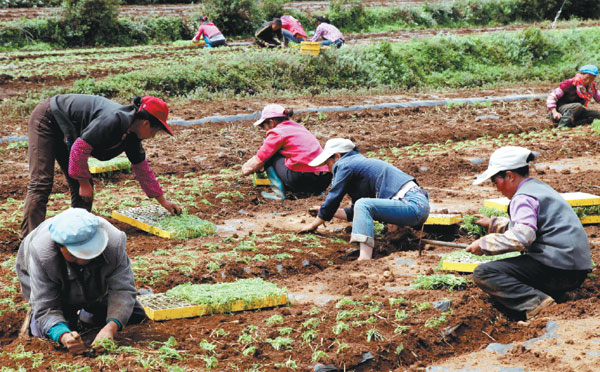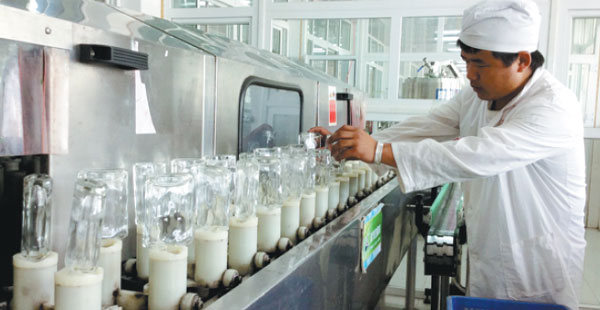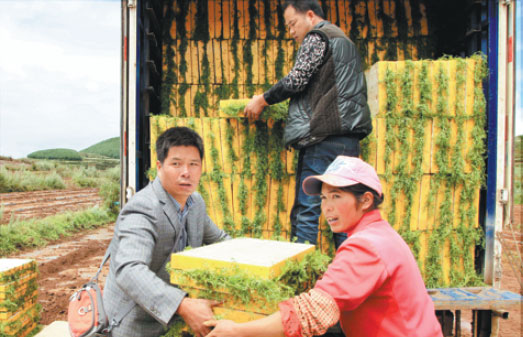Farmers look to tap root's growing appeal
Updated: 2015-11-16 07:45
By Yang Wanli and Li Yingqing(China Daily)
|
||||||||
Rising living standards and greater appreciation of healthy lifestyles have resulted in soaring demand for Maca, the latest 'miracle' plant, as Yang Wanli and Li Yingqing report from Lijiang, Yunnan province.
The human desire for longer life is insatiable, it seems. In the 1950s, life expectancy in China was about 40. In 2010, 60 years later, medical advances and higher standards of living meant Chinese people were expected to live to an age of 74.5 years, and by 2020, average life expectancy will be extended by a further two and a half years, according to official projections.
But that's still not enough for some people, who continue to look for ways of improving their physical condition and maintain as much health and vigor as possible. That passion has become a powerful driver behind the growing popularity of Maca, a plant native to Peru that's being touted as the latest "miracle" in China's booming health food market.
|
Villagers transplant maca seedlings in Laoqing village, Qiaojia county, Yunnan province, in August last year. The plant, nicknamed "herbal Viagra", was introduced to China from Peru 15 years ago. Yan Keren / For China Daily |
|
A worker at a filling line for maca wine at Yancheng Baisuifang, one of the largest processers and retailers of the root in Lijiang, Yunnan. Yang Wanli / China Daily |
|
Farmers unload boxes of maca seedlings from a truck on farmland in Laoqing in August last year. Demand for the root has soared in recent years. Yan Keren / For China Daily |
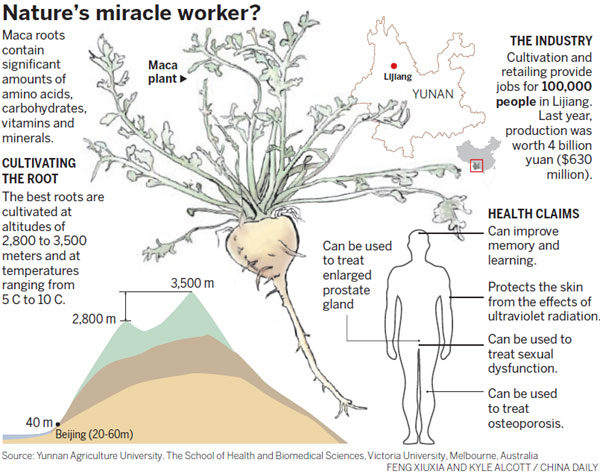
Lijiang, in the southwestern province of Yunnan, is China's biggest Maca cultivation area. Back in 2002, the city produced just 200 kilograms of the radish-like root, but since 2010, when the plant's nutritional benefits and perceived boosts to energy and sexual performance started being advertised nationwide, farmers have produced bumper harvests.
Last year, 21,000 metric tons of fresh Maca root worth 4 billion yuan ($626 million) were harvested in Lijiang, according to official statistics. In 2013, fresh roots sold over the counter for between 100,000 and 200,000 yuan per ton. Last year, the price peaked at 600,000 to 800,000 yuan, when the industry attracted 800 million yuan in private investment, and contributed tax revenue of 900 million yuan to the local government.
Experts predict that the market for Maca will expand further, and that could be bad news for the environment because the soaring price has prompted unregulated expansion.
The ever-rising price has overexcited the industry and resulted in irrational planting and excessive use of pesticides and chemicals, directly affecting the quality of the root, according to Yang Honggang, founder and manager of Yancheng Baisuifang, one Lijiang's largest Maca retailers.
"Farmers are obsessed with the soaring price, but the nutrients in the root will be destroyed because of unseasonal sowing," Yang said, adding that some farmers started planting early in the year, rather than waiting for the more-traditional late-May sowing season.
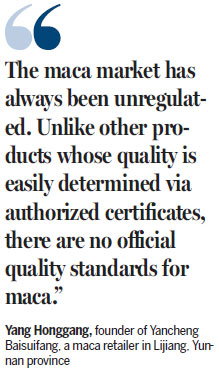
The resultant oversupply saw the price plummet during the summer, and poor quality roots harvested in May are now entering the market, mixed with fresh roots. The situation is getting out of hand, he said. "The Maca market has always been unregulated. Unlike other products whose quality is easily determined via authorized certificates, there are no official quality standards for Maca," he said. "Even with the high price, customers still run the risk of being cheated with low-quality roots, and you only know if the quality is good or bad by eating them."
Aphrodisiac appeal
Traveling in Lijiang is not just an exploration of the cultures of local ethnic groups, such as the Naxi, the Bai, and Tibetans, or the stunning views of snow-capped mountains. Maca, is the city's "business card" and can be seen everywhere, from huge billboards at the airport to downtown supermarkets. Promotional material can even be found in restrooms, with posters on cubicle doors that read: "When men eat Maca, they always behave as though they are 20 years of age", an obvious reference to the root's apparent aphrodisiac qualities.
A casual Internet search produces descriptions such as "herbal Viagra", and "a natural sex booster", although Lijiang locals make light of such claims, preferring to emphasize that the root promotes hormonal balance, nourishes and regulates the endocrine system and reduces night sweats.
"I first heard about the miraculous effects of Maca at a dinner with some government officials in 2008. Maca wine was a popular nutritional drink among officials and businessmen at the time," Yang said. "One of them carefully took a black clay pot from his bag and offered us the wine. He said he always felt more vigorous after drinking it."
Large-scale, corporate cultivation of Maca began in Yunnan in 2010. Before that, the root was mainly grown by small, family owned wine stores where it was immersed in distilled spirit - a common method of extracting active herbal ingredients from plants.
Before Yang started his business in 2011, he conducted research at several small shops. "The wine was stored in large jars, and most of the customers were individuals who only bought one or two bottles. The retailers used a gourd ladle to remove the wine from the jar, because there were no automated filling systems like the ones we see nowadays," he said.
Other benefits
Although many people have dismissed the claims of health benefits conferred by Maca, scientists say the stories are not folklore, but have already been proven correct. Early in 2004, a research paper published by the College of Life Science and Technology at Huazhong University of Science and Technology in Wuhan, Hubei province, concluded that Maca contains a number of branched-chain amino acids, which aid muscle protein, and taurine, which is believed to have anti-oxidant properties. The plant's ability to boost energy levels was also proved via a series of experiments on animals.
Yancheng Baisuifang operates four productions lines making dried root slices, wine, coffee and pills. The pills account for 50 percent of the company's total sales and are extremely popular with consumers from outside Yunnan.
"The feedback we received from many companies showed that the nutritional aspects of Maca play better with consumers in other provinces, especially those on the coast or the interior," said Ma Baihua, an official at the Lijiang Biological Resources Development and Innovation Office. "It's hard to determine the reason, but in traditional Chinese medicine its common that herbs native to the north of the country provide more-effective treatments for patients in the south."
Employment boost
Yang Shengchao, an associate professor at Yunnan Agriculture University in Kunming, capital of Sichuan province, said the best Maca is grown at an altitude of 2,800 to 3,500 meters and at temperatures of 5 to 10 C.
Since the root was introduced to China 15 years ago, Lijiang has become the country's largest Maca-cultivating base, thanks to its climate and altitude which resemble those in Peru, the global center of Maca production.
Statistics from Ma's office show that the root provides work for 100,000 residents, which has made a huge contribution to the alleviation of poverty. Planting 100 square meters of black Maca - the color represents the highest quality - can bring a farmer an average annual net income of 30,000 yuan, according to Ma.
In 2011, more than 90 percent of the company's fresh roots were bought from small producers - 986 family farms - and Dong Wanhong, manager of Yancheng Baisuifang's processing department, said the relationship encountered early difficulties.
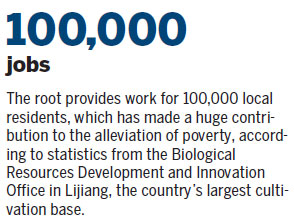
"The concept of poverty alleviation via cooperation between farmers and companies seemed a good one, but problems quickly emerged. As a result of the soaring price, farmers who had signed a contract a year before the harvest season secretly stored black and larger roots to sell themselves and passed on inferior roots to us," he said. "In turn, if the price falls, they buy roots from other suppliers and mix them with their own in the hope of clearing their stocks."
As a result, Yancheng Baisuifang started running its own farms and now only 50 percent of its raw materials come from external sources. However, other problems undermining the industry are beyond the companies' control, such as pesticide residue and the overuse of chemicals on family farms to boost crop yields.
Quality concerns
The price of Maca not only depends on the root's color, but also its size. "The darker and bigger a root is, the higher its price will be," said Zhao Zhiwen, deputy director of Green Enhance, a large Maca retailer in Lijiang. The company has its own farms which produce 1,000 tons of fresh roots annually, all of which are processed into dry slices, power capsules and wine.
"At the moment, we aren't seeing colored roots on the market, but some farmers have treated the root with an agent that forces it to grow quickly and over a short period," said Zhao, who stressed that the plant's medicinal properties are degraded if chemical fertilizers are used to spur growth.
"That's why good quality roots command a higher price. If chemically fertilized roots entered the supply chain at a high price, the market would be roiled, which would be devastating for conscientious growers and retailers," he said.
For individual customers, buying genuine Maca root at a fair price depends on a good deal of luck. There are no official quality certificates, and size and color are no guarantee of quality. The task is even harder if the root has been processed into powders or pills.
"A quality specification is the key to regulating the business," Ma said. "As the government has limited power to intervene with individual sellers, what we can do is produce our own quality certificates to help farmers so they will regulate planting."
On Feb 10, the Lijiang Quality Control and Inspection Bureau released a technological specification on planting, and the city's first Maca Products' Quality Supervision and Testing Center began operations on June 26.
The city's Biological Resources Development and Innovation Office is drafting a guideline on planting and quality grading that will be released in the coming months, according to Ma. "The product will be graded into different levels, depending on the nutrients it contains, and the grading will be used as a reference for price," he said.
Some companies have established their own quality-control systems. Yancheng Baisuifang employs agriculture experts who pay regular visits to farms to offer advice on planting and supervise the land reserves through crop rotation and fallow years to ensure the soil regains essential minerals and elements.
In 2011, the value of the company's annual output hit 10 million yuan, and the figure doubled or tripled annually in the following four years. It is now running a lab with Huazhong University of Science and Technology to breed high-quality seeds and test nutritional composition.
"The market is now in 'survival-of-the-fittest mode'. It hurts, but really competitive companies that remain true to the ideal of producing high-quality roots will eventually become the market leaders," Yang said.
Contact the writers at yangwanli@chinadaily.com.cn
(China Daily 11/16/2015 page6)

 French warplanes strike Islamic State Syria bastion
French warplanes strike Islamic State Syria bastion
 Xi, Putin meet at G20 summit, renewing pledges on cooperation
Xi, Putin meet at G20 summit, renewing pledges on cooperation
 Eiffel Tower goes dark as France mourns terrorist attack victims
Eiffel Tower goes dark as France mourns terrorist attack victims
 Victims of terrorist attacks in Paris commemorated worldwide
Victims of terrorist attacks in Paris commemorated worldwide
 Standing shoulder to shoulder with France
Standing shoulder to shoulder with France
 Paris shooting and explosions in photos
Paris shooting and explosions in photos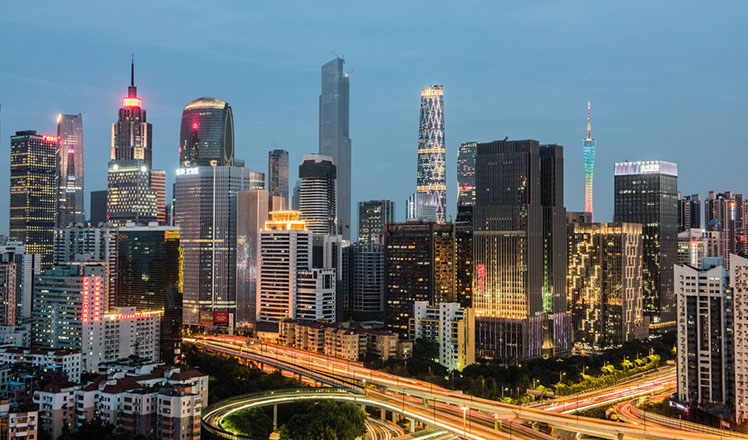
 Top 10 regions that led the shopping spree on Singles Day
Top 10 regions that led the shopping spree on Singles Day
 Traditional Yuju Opera faces dilemma
Traditional Yuju Opera faces dilemma
Most Viewed
Editor's Picks

|

|

|

|

|

|
Today's Top News
Chinese president arrives in Turkey for G20 summit
Islamic State claims responsibility for Paris attacks
Obama, Netanyahu at White House seek to mend US-Israel ties
China, not Canada, is top US trade partner
Tu first Chinese to win Nobel Prize in Medicine
Huntsman says Sino-US relationship needs common goals
Xi pledges $2 billion to help developing countries
Young people from US look forward to Xi's state visit: Survey
US Weekly

|

|
